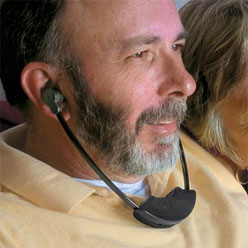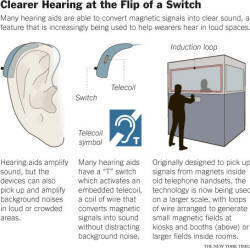
I don’t know if anyone here has ever conducted a survey of the top ten things that really stress relationships, particularly in a multi-generational home, but I would guess the volume of the TV makes the top ten. Ok, maybe the top three. 🙂
There’s potential solution to the problem making it’s way from public spaces into the home: hearing loops or assistive listening systems.
The basic technology, called an induction loop, has been around for decades as a means of relaying signals from a telephone to a tiny receiver called a telecoil, or t-coil, that can be attached to a hearing aid. Telecoils are also used to receive signals from loops connected to microphones in halls, stores, taxicabs and a host of other places.
 A hearing loop, typically installed on the floor around the periphery of a room, is a thin strand of copper wire radiating electromagnetic signals that can be picked up by a tiny receiver already built into hearing aids and cochlear implants. When the receiver is turned on, the hearing aid receives only the sounds coming directly from a microphone, not the background cacophony.
A hearing loop, typically installed on the floor around the periphery of a room, is a thin strand of copper wire radiating electromagnetic signals that can be picked up by a tiny receiver already built into hearing aids and cochlear implants. When the receiver is turned on, the hearing aid receives only the sounds coming directly from a microphone, not the background cacophony.
Great Britain and most of Northern Europe already lead the way in having these loops in place. Part of the widespread use is attributed to the fact that nearly all the hearing aids distributed by the National Institutes of Health have T-coils in them. In the U.S. only about 30%.
|
|
“People with hearing loss can dream of a future when hearing aids might also serve as wireless loudspeakers, delivering clear, customized sound from inside their ears. They can dream of communities where worship places, auditoriums, business windows, and home TV rooms all broadcast their sound through these in-the-ear loudspeakers,” says David G. Myers, a professor of psychology at Hope College in Holland, Mich. and founder of HearingLoop.org. HearingLoop.org has more information about the technology including places to purchase it and people who can install a loop system in your home.
We may have to coin a new phrase: “The Loop System Sounds Too Good To be True.” We predict that soon a lot of people will be able to remove at least one level of stress in their relationships because it really is true.


